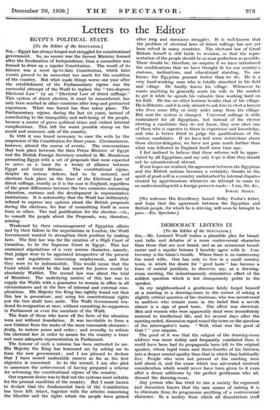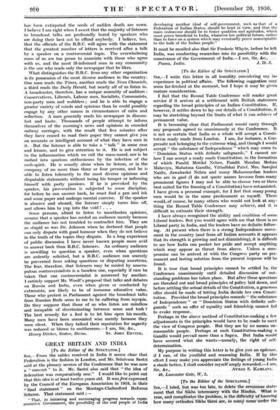DEMOCRACY LISTENS IN
[To the Editor of the SPECTATOR.] SIR,—Mr. Leonard Woolf makes a plausible plea for broad- cast talks and debates of a more controversial character than those that are now heard, and as an occasional broad- caster and a regular listener I heartily agree with it. Con- troversy is the brain's breath. Where there is no controversy the mind wilts. One has only to live in a small country town, in which the desire for good taste " has become a form of mental paralysis, to discover, say, at a drawing- room meeting, the instantaneously stimulative effect of the mildest question which is not obsequiously polite to the speaker.
In my neighbourhood a gentleman lately forgot himself at a meeting in a drawing-room to the extent of asking a slightly critical question of the chairman, who was accustomed to auditors who remain mum in the belief that a servile silence .is a sign of good taste. The effect was electrical. Men and women who were apparently dead were immediately restored to intellectual life, and for several days after the meeting ended, discussion raged round the town on the question of the interrogator's taste. " Well, what was the good of that ? " you enquire.
The good of it was that the subject of the drawing-room address was more widely and frequently ventilated than it could have been had its propaganda been left to the original speaker, whose tepid tones sent three-fourths of his listeners into a deeper mental apathy than that in which they habitually live. People who- were not present at the meeting were told about it, and the cause which was advocated received consideration which would never have been given to it even after a dozen addresses by the perfect gentleman who ad- dressed the drawing-room.
- Any person who has tried to run A society for argument and discuision knows that the mire means of ruining it is lo eliminate from-its programme anything of a controversial character. In a society from which all disputatious stuff
has been extirpated the seeds of sudden death are sown. I believe I am right when I assert that the majority of listeners to broadcast talks are profoundly bored by speakers who are doing their best not to offend anybody. I believe, too, that the officials of the B.B.C. will agree with the statement that the greatest number of letters is received after a talk by a speaker on a controversial topic. The overwhelming mass of us are too prone to associate with those who agree with us, and the most ill-informed man in any community is the one who reads only the newspaper that he likes.
What distinguishes the B.B.C. from any other organization is its possession of the most diverse audience in the country. One man reads the Times, another reads the News Chronicle, a third reads the Daily Herald, but nearly all of us listen in. A broadcaster, therefore, has a unique assembly of auditors : Conservatives, Liberals, Labour men, Socialists, Communists, non-party men and wobblers ; and he is able to engage a greater variety of minds and opinions than he could possibly engage by any other means in circumstances of calm and reflection. A man generally reads his newspaper in discom- fort and haste. Thousands of people attempt to inform themselves of the morning's news and opinions in crowded railway carriages, with the result that five minutes after they have ceased to read their paper they cannot give you an accurate or intelligent account of what they have seen in it. But the listener is able to take a " talk " in some ease and leisure, and to give attention to it. He is not subject to the inflammation which we call the mass-mood, nor is he rushed into spurious enthusiasms by the infection of the mob-spirit. He is usually alone when he listens, or in the company of no more than three or four persons, and he is able to listen tolerantly to the most diverse opinions and disputable statements without losing his temper or inflaming himself with party passions. If he is provoked by the speaker, his provocation is subjected to some discipline, for before he can answer back, he must find a pen and ink and some paper and undergo mental exercise. If the speaker is abusive and absurd, the listener simply turns him off, and allows him to yap into the void ! . . . Some persons, afraid to listen to unorthodox opiniok assume that a speaker has misled an audience merely because the audience has not troubled to contradict him. They are as stupid as was Dr. Johnson when he declared that people can only dispute with good humour when they do not believe in the truth of the topics they dispute. In a long experience of public discussion I have never known people more avid to answer back than B.B.C. listeners. An ordinary audience is unwilling to question a speaker, even when questions are ardently solicited, but a B.B.C. audience can scarcely be prevented from asking questions or disputing assertions. The fear, therefore, that listeners may be misled by unscru- pulous controversialists is a baseless one, especially if care be taken that one controversialist is answered by another. I entirely support Mr. Woolf s proposal that talks and debates on Russia and India, even when given or conducted by extremists, are likely to be of immense edueative value. Those who protest in Parliament against the broadcast talks from Russian Reds seem to me to be suffering from myopia. Do they suppose that those of us who listen are mindless
and incapable of discriminating between sense and tosh ? The best remedy for a fool is to let him open his mouth.
Many men have been accounted wise merely because they were silent. When they talked their reputation for sagacity was reduced or blown to smithereens. —I am, Sir, &c.,







































 Previous page
Previous page